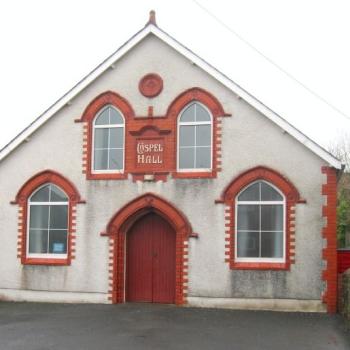Today I am publishing the fifth and final segment of my interview with Rob Rufus. The following links represent the posts which make up the first four parts of this interview:
- Preacher Rob Rufus
- Rob Rufus on Word and Spirit
- Rob Rufus on How To Explore the Charismatic
- Rob Rufus on apostles Today
In the last segment of my interview with Rob we spoke about his belief in apostles today and a bit about the family of churches of which he is a part. Today we will explore more about how this works in practice.
Adrian
So how does this all work? How do you hold such a vast movement like that together? How do you control it, or don’t you even try to control it?
Rob Rufus
I haven’t got a clue! (Laughter) We’ve never tried to plan—we’ve never said, “We’re going to invade this nation—we’re going to go there!”—everything we learned we stumbled on. We’ve learned as we’ve gone along. As doors have opened, we’ve gone through the doors. We do believe in the organic, not the organizational. The organic is something that just evolves. I mean, the Spirit blows where he wills, so as he evolves things, we just try to follow the leading and guiding of the Holy Spirit. And then, of course, once you’re in a nation you do have to organize. We’re not anti-organization. But you don’t organize and expect God to come. God comes, you follow him, and then you organize. So, how we work with all these churches, the challenge is that as the number of churches is growing, the danger is that you can end up looking for a denominational or headquarters type—that’s the danger you have to avoid all the time. Because good people who are put in charge of churches can end up becoming dictatorial and think “these churches are mine” to fire or hire or whatever.
Adrian
How does that work with apostles? Do you have an apostle for each country?
Rob Rufus
We have tried very strongly to avoid doing that because we don’t want regional apostles; we want international apostles because in the book of Acts they were in the dynamic power of God. They were turning the world upside down as a primitive church—simple, clean wineskins. But about 300 AD they started ordaining regional bishops, and that was the beginning of the end and the slide into the Dark Ages. So we try to avoid having regional apostles. But to qualify that, that’s not to say that some apostolic ministries won’t tend to have more influence in their region. Some, like Paul, are called primarily to the Gentiles, and others, like Peter, primarily to the Jews. So there is that “setting apart” that God may give certain apostles more influence in Africa or America or Australia, but they must never get territorial and say, “This is my territory. You guys from Africa, even though we are on the same team, don’t you come in here!” What we’ve said to all the churches that relate to our international team is, “You can invite anyone on the international team to come to you. You don’t have to be exclusively in an arbitrary way restricted to just the apostolic ministry resident in your country. You can invite the apostolic ministry from outside the nation so there is no regional control. And, of course, invite other people from other streams as well because we don’t want to be exclusive. It becomes a little bit incestuous when all you do is feed off your own lives and ministries.
They were turning the world upside down as a primitive church—simple, clean wineskins. But about 300 AD they started ordaining regional bishops, and that was the beginning of the end and the slide into the Dark Ages. So we try to avoid having regional apostles. But to qualify that, that’s not to say that some apostolic ministries won’t tend to have more influence in their region. Some, like Paul, are called primarily to the Gentiles, and others, like Peter, primarily to the Jews. So there is that “setting apart” that God may give certain apostles more influence in Africa or America or Australia, but they must never get territorial and say, “This is my territory. You guys from Africa, even though we are on the same team, don’t you come in here!” What we’ve said to all the churches that relate to our international team is, “You can invite anyone on the international team to come to you. You don’t have to be exclusively in an arbitrary way restricted to just the apostolic ministry resident in your country. You can invite the apostolic ministry from outside the nation so there is no regional control. And, of course, invite other people from other streams as well because we don’t want to be exclusive. It becomes a little bit incestuous when all you do is feed off your own lives and ministries.
Tope
The way you’re describing it, it’s far more fluid. There is structure to it, but it is sufficiently loose to allow relationships to continue to happen, and everything is forced through relationships. That’s amazing. How do you manage to keep the distinctives or the values that you have? How do you insure they don’t get diluted out?
Rob Rufus
That’s a very good question, and when I get the answer I’ll tell you! That’s a real delicate tension because you don’t want to become a movement that becomes so uniform that when someone comes into a church they say, “You guys are all the same—talk the same, look the same, dress the same”—so you get all stereotyped. We don’t want that, but yet at the same time we do want clear distinctives because that’s the strength in distinctives and clear DNA. You can’t have part of the body with certain DNA in one part and a different DNA in another part. We’ve been very strong, like Newfrontiers, on presenting our biblical values and our biblical vision. Our biblical vision is to fulfil the Great Commission by planting churches in every town, every city, and every village in the world. Our biblical values are how we do that vision—which is with integrity, team humility, embracing the power of the Holy Spirit, honoring one another. So we preach and teach those biblical values and authority structures and vision very strongly. Those values are similar to you guys—liberty, freedom, no manipulation, not using guilt manipulation. We don’t want to stereotype people. Does that answer your question?
Tope
Yes.
Adrian
Basically how do you see the future for these kinds of movements—do you think all these movements will somehow kind of merge into one super denomination? Or is that the last thing you want? Or do you think there will be lots of little families of churches like this growing up and working alongside each other maybe a bit, and partnering along the way? How do you see it?
Rob Rufus
I think Newfrontiers, New Covenant Ministries International (NCMI), and other streams like that—to some degree I think they have been in a fair amount of obscurity for the last twenty years. I think God has hidden us on purpose and prepared us in obscurity. But I think he is going to give profile to these kinds of streams, these apostolic teams, in the world today. Because there are many people who know something’s happening in the earth, that something exciting is happening, and God is restoring his Church to be something powerful in the earth. So people are asking questions and they want to belong to something that is flexible and free, yet with sound doctrine and theology, accountability, and freedom. I believe that God is wanting these streams to keep their distinctives, and yet work with each other and “cross pollinate.” It seems Paul’s team honored Peter’s team, and so there was a real honoring, and I think that’s going to happen more and more. I think the fathers of these teams, and the apostolic leaders of these teams, are going to spend more time together and stir up each other’s faith and inspire one another.
Adrian
So it’s not about forming some big organization?
Rob Rufus
No, because then it becomes so top heavy in logistics. Then you are forced back into an organizational model where you just govern by principles. You govern by constitution rather than by the dynamic freedom of the Spirit. When it says in Acts 15 that God will restore David’s fallen tabernacle—that is an incredible prophecy out of Amos, and James himself quotes that, you know, as an answer to “Are we going to put the law on the Gentiles?” No, we’re not, and we’re going to give them freedom, and the nations are going to come into the restored tent of David. Many people think David’s fallen tent is just about praise and worship, but it is much more than that. It is a very dynamic tent, but it’s a cohesive whole. He talks, I mean there were 3, yet we’re part of the 30. But they were not the 30, and then there was another 3, but they were not part of that 3. They all were teams within teams! I think the fluidness of these streams is going to grow in profile and work alongside each other more in partnerships in the streams. I think God is going to have small-acting units as well. And God is going to not only relate people to movements, but to men as well. There are going to be men that within a movement connect better with certain men. I’m looking for men within our own NCMI movement with whom I’m connecting well to help me in China.
Adrian
I’ve taken quite a lot of your time and I guess we should draw this to an end. But I’m just wondering—Are there any final things you would like to say in closing to the people listening, who come, really, from all over the world—all kinds of different backgrounds. What would you say to them in closing, Rob?
Rob Rufus
I would say that these are amazing days, and Jesus is so wonderful, and don’t be robbed of your inheritance. You are alive on the planet now, not by coming to him, but because you have been hand-picked, selected by God to be alive at the climax of the consummation of the ages. So don’t be hijacked or seduced or hurt through bitterness or disappointment, because there is all of that happening. We have all been hurt. We’ve all been disappointed. We’ve all been there, but we must keep our eyes on the prize. And he is Jesus. He is so wonderful, and he’s so glorious, and he’s building his Church in such a wonderful way—he hasn’t finished yet, so don’t be disappointed with the Church! He has not finished yet. He is preparing us for great things in these days! God bless you guys!
Adrian
Amen. Thank you very much!















